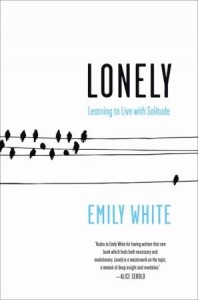~Even with close friends. . . even with people I’ve known for decades, who I still know, it’s just sometimes. . . something’s not there.~
~Harry Stack Sullivan, for instance, one of the leading psychiatrists of the twentieth century, described loneliness as a state of simply not having one’s emotional needs met, of being caught in a situation characterized by the “inadequate discharge of the need for human intimacy.”~
When I started reflecting and writing about my hermit mode, I also searched for what others were saying about loneliness and aloneness. I ended up purchasing this book and when it arrived I couldn’t put it down. What makes it so enjoyable, interesting and easy to read is that Emily White perfectly intertwines research on loneliness with her life story. Up to a certain point I was surprised by how many things I seemed to have in common with her. Divorced parents and a distant father, long periods of solitude during childhood (though for different reasons), a normal social life during high school and college but not really connecting, and finally a job that involves spending long hours alone.
The author makes it a case that chronic loneliness should be considered a mental health issue, much like depression, as there is genetic evidence some people are more prone to it than others. Studies also suggest that chronic loneliness can lead to cognitive and behavioral changes, high blood pressure, early dementia and several other ailments. She also stresses that loneliness and depression don’t necessarily go hand in hand. You can be depressed without feeling lonely, and you can be lonely without being clinically depressed. Either way, there is such a stigma about lonely people (they lack social skills, they are unattractive, they are psychopaths planning their next murder, it’s their fault they’re lonely and so on and so on and so on) that no one talks about it and raises awareness.
Lonely people feel ashamed of their state, and they have reasons for it. And here comes one of my favorite parts of the book. The author criticizes much of the self-help literature out there because it makes the lonely person feel responsible for their pain. Some of it glorify solitude as a chance for self-discovery and self-nurturing, totally missing the point. The other half takes another approach by telling lonely people that “it’s in your hands,” “it’s within your reach” to make yourself feel better, as if you can overcome by yourself things over which you have no control. This is particularly dear to me because I fell in that trap. Thankfully my therapist deconstructed that ingrained belief because I used to feel responsible for everything that happened to me and in my life. I felt responsible for being sick and sometimes I still feel responsible for my MS not listening to me and to how I take so much better care of myself now. (Like “what am I doing wrong?” Answer: nothing.) The truth is unemployment, poverty, illness, and other factors can cage people in, and sometimes there isn’t much they can do.
The book ends on a bittersweet note. Much as I thought would happen with multiple sclerosis, Emily White thought that after reading and researching so much on loneliness she would be able to keep it at bay. But although she overcame the worst of her loneliness, she still feels it lurking, waiting for a moment she looks away to settle in again. And once again she says that maybe, in this case, help can only come from the outside.

This came at the perfect time. I’m writing something on reaching out and will be re-thinking how I approach it now.
Thank you for sharing this.
LikeLike
I think Emily White’s next book will be about reaching out. I’m kind of curious. Although her situation is different from the situations of people with chronic illnesses I think she’s doing a good job in getting people to talk about loneliness.
LikeLiked by 1 person